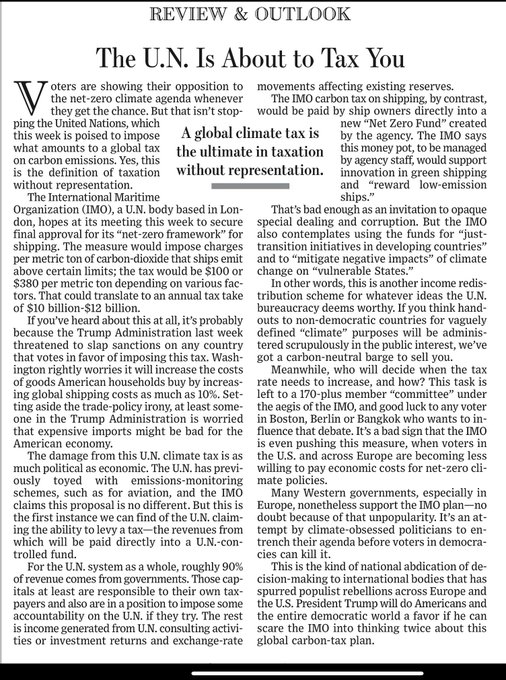
In a move that could reshape global trade and hit everyday Americans right in the wallet, the United Nations’ International Maritime Organization (IMO) is on the verge of approving a so-called “net-zero framework” for shipping. This isn’t just another bureaucratic shuffle—it’s effectively the UN’s first global carbon tax, targeting emissions from the shipping industry that powers 90% of world trade. Drafted back in April 2025, the proposal is set for a final vote this week, and if it passes, ship owners will face charges of $100 to $380 per metric ton of CO2 emitted above certain limits.
Revenues, estimated at $10 billion to $12 billion annually (and potentially scaling to $40 billion by 2030), would flow into a UN-controlled “Net Zero Fund” for green shipping innovations, rewards for low-emission vessels, and vaguely defined “just-transition initiatives” in developing countries.
Critics, including here at Energy News Beat, see this as little more than taxation without representation—a global wealth redistribution scheme dressed up in climate rhetoric, ripe for corruption and inefficiency.
How This Hits the United States Hard
For the U.S., the stakes couldn’t be higher. As the world’s largest importer, America relies heavily on shipping for everything from electronics to groceries. This tax could spike global shipping costs by up to 10%, translating directly into higher prices for consumers.
Last year alone, U.S. ports handled trillions in goods; imagine the ripple effects on inflation, supply chains, and economic growth. It’s not just about the direct hit—experts warn it could exacerbate vulnerabilities in critical sectors like energy imports, where oil and gas shipments might face added burdens.
The Trump administration has called it out plainly: this is a “global carbon tax on Americans” levied by an unaccountable UN body, threatening sovereignty and weaponizing climate policy as economic coercion.
Without U.S. participation in such schemes, non-cooperation could slash global emissions reductions by over a third due to leakage effects, but at what cost to American households?
JUST NOW: Senator Mike Lee says that the UN considering a “Climate Tax” warrants us leaving the UN.
I’m totally with him on this. pic.twitter.com/rb4jKwUTIA
— Ian Jaeger (@IanJaeger29) October 15, 2025
The Trump Administration’s Fierce Pushback
President Trump isn’t taking this lying down. His administration has mounted a full-court press against the proposal, threatening tariffs, sanctions, and other retaliatory measures on any nation that votes in favor.
Secretary of State Marco Rubio echoed this stance, rejecting the “first global carbon tax” outright and vowing to protect American consumers and industries.
In a joint statement from the Departments of Energy and State, the administration labeled the framework a neocolonial export of European climate extremism, insisting it won’t tolerate cost increases for citizens.
Despite these efforts, sources suggest the vote might still pass, with IMO Secretary-General Arsenio Dominguez pushing for emissions cuts of 8% by 2030.
Trump’s team is also dismantling domestic climate overreach while disrupting global efforts, aligning with his long-held view that such policies are economic saboteurs.
Echoes of Trump’s UN Speech: A Turning Point in Climate Realism?
This showdown comes hot on the heels of President Trump’s explosive address to the UN General Assembly on September 23, 2025, where he lambasted globalism, called climate change “the greatest con job ever perpetrated,” and ripped into ineffective UN policies.
As we covered extensively here at Energy News Beat, Trump’s off-script takedown during Climate Week sent shockwaves through the green energy crowd, labeling the Paris Accord “fake” and criticizing nations for their hypocritical reliance on fossil fuels.
In “The UN and Climate Week Experience the Trump Effect,” we detailed how his speech flipped the script on what was supposed to be a net-zero rally, calling out Europe on Russian oil dependencies and championing energy independence.
Follow-ups like “Wall Street Rediscovers Oil and Gas after Trump’s Trounce on Climate and Green Energy at the UN” highlighted the market’s positive response, with investors pivoting back to reliable fossil fuels amid the backlash.
And in “Fear and Loathing in the Net Zero Camp,” we explored the broader fallout, including growing realism in policies worldwide as Trump’s words exposed the flaws in global climate mandates.
But is this IMO tax push a retaliation for Trump’s fiery UN speech? Unlikely. The framework was approved in draft form back in April 2025—months before Trump’s September address.
While tensions are high, with Trump admonishing the UN’s “ineffectiveness” and climate efforts, the timeline points to this being part of a long-brewing agenda rather than direct payback.
That said, Trump’s unapologetic stance has undoubtedly escalated the fight, putting the UN on defense and rallying support for energy realism.
At Energy News Beat, we’ve long argued that these international schemes prioritize ideology over affordability and security. The UN’s climate tax is a prime example: it burdens working families while funneling billions into opaque funds with little accountability. Kudos to the Trump administration for standing firm—America’s energy future depends on it. Stay tuned as we track the vote and its ripples across the global energy landscape.
I, for one, would like the UN defunded and thrown out of the United States. But that is just me.
Got Questions on investing in oil and gas? Or do you have a Tax Burden in 2025?
Crude Oil, LNG, Jet Fuel price quote
ENB Top News
ENB
Energy Dashboard
ENB Podcast
ENB Substack







